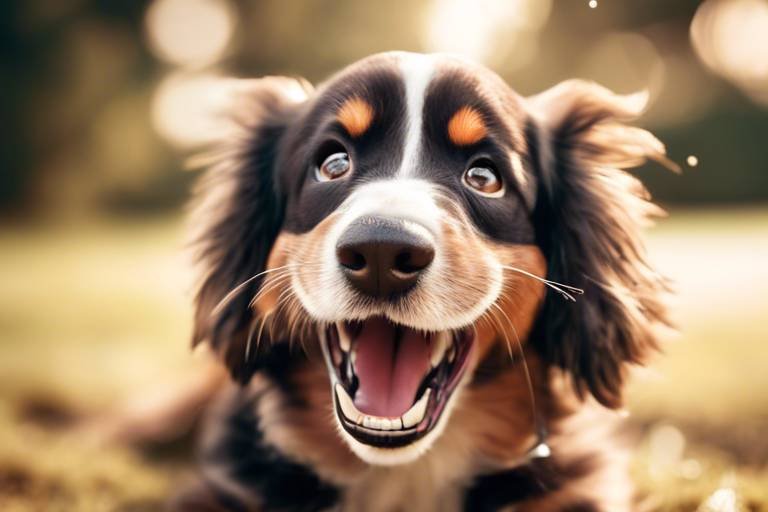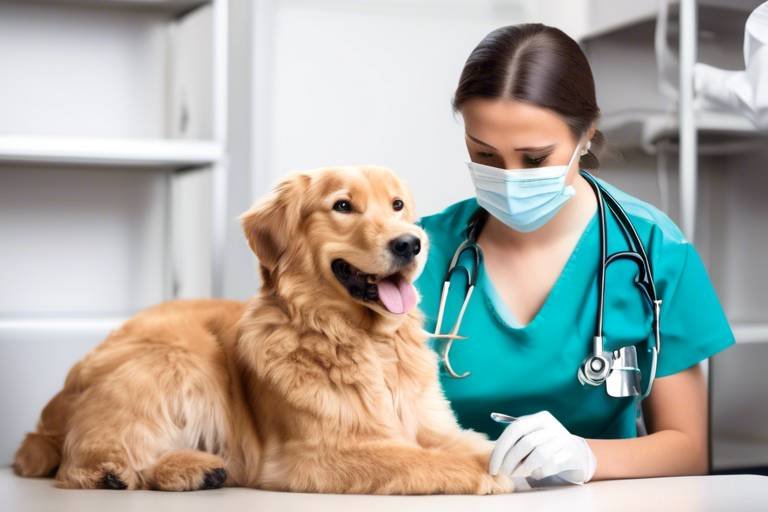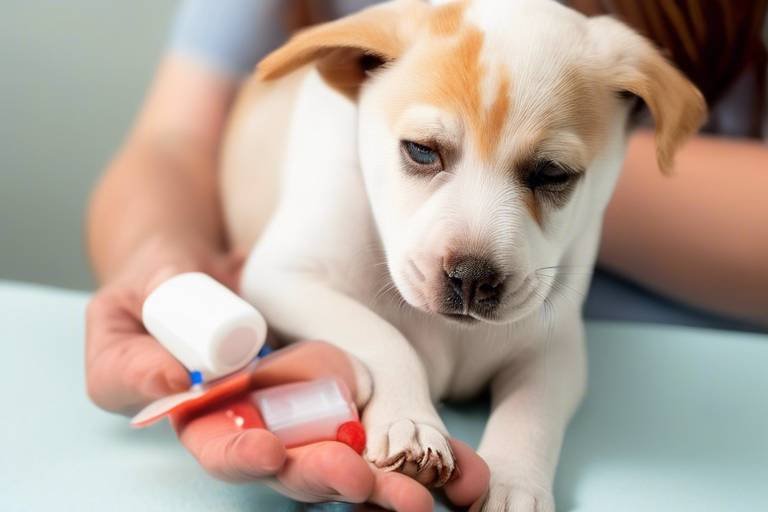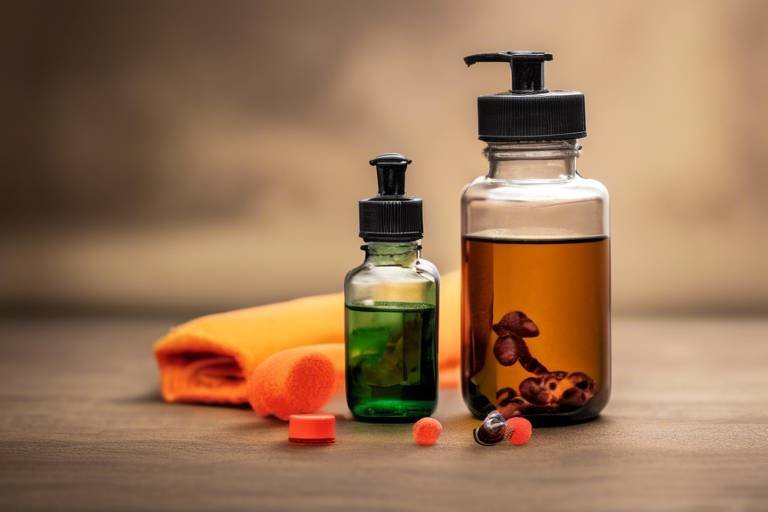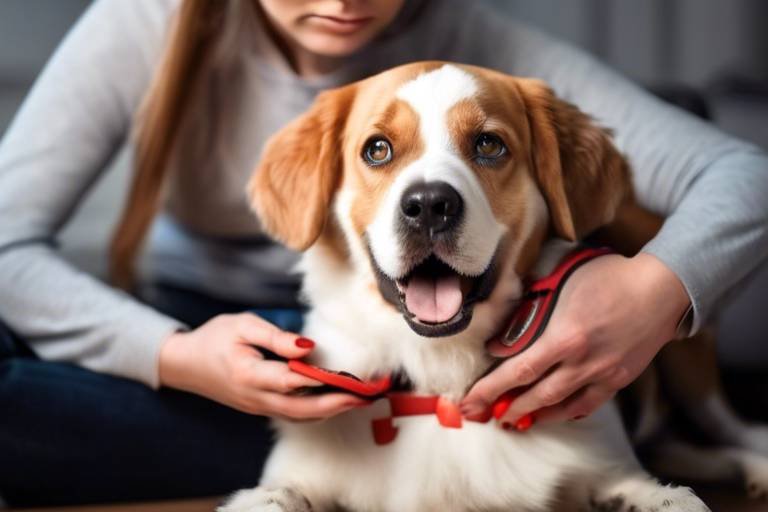Understanding the Importance of Pet Dental Care
When it comes to our furry companions, we often think about their diet, exercise, and overall well-being, but one crucial aspect that frequently gets overlooked is dental care. Just like humans, pets require regular dental hygiene to maintain their health. Poor dental health can lead to a myriad of issues, not only affecting their mouths but also their overall health. Imagine your pet's mouth as a gateway to their body; if that gateway is blocked by plaque and tartar, it can lead to serious health problems. In this article, we will delve into the importance of pet dental care, exploring common dental issues, preventive measures, and the overall impact on their health and well-being.
Good dental health for pets encompasses a variety of factors, including the anatomy of their teeth and gums. Pets have different types of teeth, each serving a specific purpose, from tearing to grinding food. Their gums also play a vital role in protecting the roots of their teeth. When we think about dental health, it's not just about having clean teeth; it's about ensuring that the entire mouth is healthy and functioning properly. Neglecting dental care can lead to periodontal disease, where bacteria build up in the mouth, leading to infections that can affect other organs. It’s essential to understand that what happens in your pet’s mouth can have a ripple effect throughout their body.
Just as we face dental problems, our pets do too. Some of the most prevalent dental issues include periodontal disease, tooth decay, and gingivitis. Periodontal disease is particularly common and can lead to tooth loss if not addressed. Symptoms may include bad breath, swollen gums, and difficulty eating. Tooth decay, on the other hand, can occur when plaque hardens into tartar, leading to cavities. Gingivitis is an inflammation of the gums that can cause pain and discomfort. If left untreated, these issues can escalate, leading to serious health consequences.
Recognizing the signs that your pet may require dental attention is vital for early intervention and treatment. Just like we might ignore a toothache, pets can also hide their discomfort. Here are some signs to watch out for:
- Behavioral Changes: If your pet is suddenly less interested in their food, more irritable, or reluctant to play, it could be a sign of dental pain.
- Physical Symptoms: Bad breath, swollen gums, or loose teeth are clear indicators that your pet may be experiencing dental issues.
Implementing a regular dental care routine can significantly reduce the risk of dental problems in pets. This includes brushing their teeth regularly, providing dental chews, and scheduling routine veterinary check-ups. Just as we visit the dentist for cleanings, our pets need that same level of care. The earlier you start a dental routine, the better it will be for your pet's overall health.
Diet plays a crucial role in maintaining dental health for pets. What your pet eats can either contribute to or help prevent dental issues. For instance, some pet foods are specifically formulated to reduce plaque and tartar buildup. Additionally, incorporating dental chews and treats into your pet's diet can provide additional cleaning benefits while satisfying their chewing instincts. Think of it as a two-in-one solution: they get to enjoy a tasty treat while also taking care of their teeth!
Selecting high-quality pet food formulated for dental health can aid in reducing plaque and tartar buildup. Look for foods that have the Veterinary Oral Health Council (VOHC) seal of approval, as these are specifically designed to promote dental health. Just like we choose foods that are good for our health, the same applies to our pets.
Incorporating dental chews and treats into your pet's diet can provide additional cleaning benefits. These products are designed to help scrape away plaque and tartar as your pet chews. They also satisfy your pet's natural urge to chew, making it a win-win situation!
Regular veterinary dental cleanings are essential for maintaining your pet's oral health. These cleanings help prevent serious dental diseases and ensure a long, healthy life. During a professional cleaning, your veterinarian will remove plaque and tartar buildup, check for any abnormalities, and provide guidance on at-home care.
Understanding what happens during a professional dental cleaning can alleviate concerns. Typically, the process involves anesthesia, scaling to remove tartar, polishing the teeth, and possibly taking X-rays to check for underlying issues. While it may sound intimidating, it's a crucial step in ensuring your pet's long-term health.
Determining how often your pet should receive professional dental care depends on various factors, including age, breed, and existing dental health conditions. Generally, it's advisable to have your pet's teeth checked at least once a year, but some pets may require more frequent visits based on their individual needs.
1. How often should I brush my pet's teeth? Ideally, you should brush your pet's teeth daily. However, even a few times a week can make a significant difference.
2. Are dental chews effective? Yes, dental chews can help reduce plaque and tartar buildup, but they should complement regular brushing and veterinary check-ups.
3. What are the signs of dental disease in pets? Look for bad breath, swollen gums, changes in eating habits, and loose teeth as signs of potential dental disease.

The Basics of Pet Dental Health
When it comes to our furry companions, dental health is often an overlooked aspect of their overall well-being. Just like humans, pets can suffer from a variety of dental issues that can lead to serious health problems if not addressed. Understanding the anatomy of your pet's teeth and gums is essential for recognizing what constitutes good dental health. Pets typically have 42 teeth, and these pearly whites are designed for their unique dietary needs. The anatomy of a pet's mouth includes not just the teeth, but also the gums, tongue, and other supporting structures that play a crucial role in their ability to eat, drink, and maintain overall health.
Good dental health means keeping those teeth clean and free from plaque and tartar buildup. When plaque hardens, it turns into tartar, which can lead to periodontal disease, a common yet serious condition. Periodontal disease can cause inflammation, pain, and even tooth loss. Additionally, it can allow bacteria to enter the bloodstream, potentially affecting your pet's heart, liver, and kidneys. This is why regular dental care is not just a cosmetic concern; it's a matter of life and health.
To ensure your pet enjoys a healthy mouth, regular dental check-ups with your veterinarian are essential. These visits can help identify any early signs of dental issues before they escalate into more severe problems. During these check-ups, your vet will assess not only the visible aspects of your pet's teeth and gums but also their overall oral hygiene. It's also a great opportunity for pet owners to ask questions and learn about proper at-home dental care.
In addition to professional care, pet owners can play an active role in maintaining their pet's dental health. Regular brushing, using dental treats, and providing appropriate chew toys can all contribute to a healthier mouth. Remember, just like you wouldn't skip brushing your own teeth, your pet needs that same level of care to keep their smile shining bright.
In summary, understanding the basics of pet dental health is crucial for any pet owner. By being proactive and attentive to your pet's oral hygiene, you can help prevent serious health issues and ensure they lead a long, happy life. After all, a healthy pet is a happy pet!

Common Dental Issues in Pets
Just like us, our furry friends can face a variety of dental problems that can affect their overall health and happiness. It's essential to recognize these common dental issues early on to ensure your pet remains comfortable and healthy. Periodontal disease, for instance, is one of the most prevalent dental problems in pets, often stemming from a buildup of plaque and tartar. This condition can lead to inflammation of the gums, known as gingivitis, which, if left untreated, can progress to more severe issues like tooth loss and even systemic infections affecting the heart, liver, and kidneys.
Another common dental issue is tooth decay. While it might not be as frequently discussed, it can be just as detrimental. Tooth decay occurs when bacteria in the mouth produce acids that erode the tooth enamel. This can lead to painful cavities, which can significantly affect your pet's ability to eat and enjoy their meals. If you notice your pet avoiding food or showing signs of discomfort while chewing, it could be a sign of tooth decay.
Additionally, gingivitis is a precursor to periodontal disease and can be identified by red, swollen gums. You might also notice that your pet has bad breath, which is often a telltale sign that something is amiss in their mouth. If you catch these symptoms early, you can implement preventive measures or seek veterinary care before the issue escalates.
Other less common but equally concerning dental issues include broken teeth and oral tumors. Broken teeth can occur due to chewing on hard objects or trauma, leading to pain and potential infection. Oral tumors, while rarer, can also manifest in pets and require immediate veterinary attention. It's crucial to keep an eye on your pet's mouth and behavior, as early detection can make a world of difference in treatment outcomes.
In summary, being vigilant about your pet's dental health is vital. Regular check-ups, at-home dental care, and a keen eye for behavioral changes can help you catch these common dental issues early. If you suspect your pet is suffering from any dental problems, do not hesitate to consult your veterinarian. Remember, a happy pet is a healthy pet, and that includes their dental health!
- How often should I brush my pet's teeth? It's best to brush your pet's teeth at least two to three times a week, but daily brushing is ideal for optimal dental health.
- What are the signs of dental disease in pets? Look for symptoms like bad breath, swollen gums, difficulty eating, and excessive drooling.
- Can dental issues affect my pet's overall health? Yes, dental problems can lead to serious health issues, including infections that can affect the heart and other organs.
- Are there specific foods that can help with dental health? Yes, certain dental diets and treats can help reduce plaque and tartar buildup. Consult your vet for recommendations.
Signs Your Pet Needs Dental Care
Recognizing the signs that your furry friend may need dental care is crucial for ensuring their comfort and overall health. Just like humans, pets can experience a range of dental problems that can lead to serious health issues if left untreated. So, how can you tell if your pet is in need of some dental TLC? Let’s dive into the common indicators that should raise a red flag for pet owners.
First and foremost, behavioral changes in your pet can be a clear sign that something is amiss. If your usually playful pup suddenly becomes irritable or shows reluctance to engage in their favorite activities, it might be time to investigate further. Pets are masters at hiding pain, so any noticeable shift in their behavior should not be overlooked. Moreover, changes in eating habits, such as a reluctance to chew or a sudden preference for softer foods, can indicate that your pet is experiencing discomfort due to dental issues.
Next, let’s talk about physical symptoms. Bad breath, or halitosis, is often one of the first signs that your pet may have dental problems. While it’s normal for pets to have a bit of odor, a sudden change to a foul smell can indicate the presence of plaque or even periodontal disease. Additionally, if you notice swollen or bleeding gums, or if your pet has loose teeth, these are serious signs that immediate veterinary attention is needed. Ignoring these symptoms can lead to more severe health complications, including infections that could affect other organs.
To help you better understand these signs, here’s a quick overview:
| Signs | Description |
|---|---|
| Behavioral Changes | Increased irritability, reluctance to play, or changes in eating habits. |
| Bad Breath | A sudden change to a foul smell from your pet's mouth. |
| Physical Symptoms | Swollen gums, loose teeth, or bleeding during chewing. |
It’s important to keep an eye on these signs and consult your veterinarian if you notice any of them. Early intervention can save your pet from unnecessary pain and expensive treatments down the road. Remember, a happy pet is a healthy pet, and maintaining their dental health is a key part of that equation!
- How often should I brush my pet's teeth? Ideally, you should brush your pet's teeth daily, but even a few times a week can make a significant difference.
- What are the best dental treats for pets? Look for treats that are specifically designed to promote dental health, such as those that help reduce plaque and tartar buildup.
- When should I take my pet for professional dental cleanings? Generally, pets should have a professional dental cleaning at least once a year, but this can vary based on their dental health and breed.
Behavioral Changes
When it comes to our furry friends, changes in behavior can often be the first indication that something isn't quite right. Just like us, pets can experience discomfort and pain, and they often communicate these feelings through their actions. If you've noticed your pet becoming more withdrawn, irritable, or even aggressive, it might be time to consider their dental health. For instance, a normally playful pup might suddenly shy away from their favorite toys or refuse to engage in games they once loved. This change in behavior can be a significant red flag, suggesting they could be experiencing dental pain.
Additionally, you might observe shifts in their eating habits. A pet that used to devour their meals with gusto might start to pick at their food or, worse, refuse to eat altogether. This could be due to discomfort while chewing or a fear of pain associated with their teeth or gums. The connection between dental health and behavior is crucial; after all, a pet in pain is likely to behave differently than one who is comfortable and healthy.
It's also essential to monitor how your pet interacts with you and other pets. Increased irritability or aggression can stem from discomfort, and your pet may lash out when touched near their mouth or face. These behavioral changes are not just concerning; they are vital clues that something may be amiss in your pet's oral health. If you notice any of these signs, it’s crucial to consult with your veterinarian as soon as possible to address the issue before it escalates into a more severe problem.
Ultimately, being attentive to your pet's behavior can make a significant difference in their overall well-being. By recognizing these subtle changes, you can take proactive steps to ensure your pet receives the care they need. Remember, a happy pet is a healthy pet, and keeping an eye on their behavior is a great way to start.
- How often should I brush my pet's teeth? It's ideal to brush your pet's teeth daily, but even a few times a week can help maintain good dental health.
- What are the signs of dental disease in pets? Look for bad breath, swollen gums, loose teeth, and changes in eating habits.
- Can dental issues affect my pet's overall health? Yes, poor dental health can lead to serious health issues, including heart and kidney problems.
- Are dental chews effective for cleaning my pet's teeth? Yes, dental chews can help reduce plaque and tartar buildup, but they should complement regular dental care.
- How can I make my pet comfortable during dental care? Gradually introduce dental care products and make the experience positive with treats and praise.
Physical Symptoms
When it comes to your furry friends, their health is often reflected in their behavior and physical appearance. One of the most telling signs that your pet may be experiencing dental issues lies in their mouth. Bad breath, or halitosis, is often the first noticeable symptom. If your pet's breath smells more like a garbage dump than a sweet puppy or kitten, it’s time to take action. This unpleasant odor is usually a result of bacterial buildup in the mouth, which can lead to further complications if ignored.
Another physical symptom to watch for is swollen gums. Healthy gums should be a nice pink color, but if you notice that your pet’s gums appear red, inflamed, or even bleeding, it could indicate a serious dental issue such as gingivitis. This inflammation is not just a cosmetic concern; it can cause your pet significant pain and discomfort, making it difficult for them to eat or even play.
Loose teeth are also a significant red flag. If you notice that your pet has a tooth that seems to wiggle when they chew their favorite toy, it’s likely that they are suffering from periodontal disease, which can lead to tooth loss if not treated promptly. Tooth decay can also manifest as discolored or broken teeth, which are signs that your pet needs immediate veterinary attention.
In addition to these symptoms, pay attention to your pet's overall behavior. If they are suddenly less enthusiastic about their meals or seem to be favoring one side of their mouth while chewing, it may indicate that they are experiencing discomfort due to dental issues. It’s crucial to address these signs early on to prevent further complications and ensure your pet’s comfort and well-being.
To summarize, here are some key physical symptoms that indicate your pet may need dental care:
- Bad Breath: A strong, unpleasant odor from your pet's mouth.
- Swollen or Bleeding Gums: Red, inflamed gums that may bleed.
- Loose or Discolored Teeth: Teeth that are not stable or have noticeable damage.
- Changes in Eating Habits: Reluctance to eat or chewing on one side of the mouth.
Recognizing these physical symptoms early can make a world of difference in your pet's dental health. If you notice any of these signs, don’t hesitate to consult your veterinarian. They can provide a thorough examination and recommend the best course of action to keep your pet's teeth and gums healthy.
Q: How often should I brush my pet's teeth?
A: Ideally, you should brush your pet's teeth daily. However, even a few times a week can significantly help in reducing plaque buildup.
Q: Are dental treats effective?
A: Yes, dental treats can be effective in reducing plaque and tartar. Look for treats that have the Veterinary Oral Health Council (VOHC) seal of approval.
Q: What should I do if my pet has bad breath?
A: Bad breath can be a sign of dental disease. Schedule a veterinary visit to determine the underlying cause and appropriate treatment.
Q: How can I tell if my pet is in dental pain?
A: Signs of dental pain include reluctance to eat, changes in chewing habits, increased irritability, and excessive drooling.
Preventive Dental Care Tips
When it comes to keeping your furry friend's smile bright and healthy, prevention is key. Just like us humans, pets can greatly benefit from a solid dental care routine. Imagine trying to enjoy a delicious meal while battling a toothache; that's exactly how your pet feels when dental issues arise. To ensure your pet stays comfortable and happy, consider implementing the following preventive dental care tips into their daily routine.
First and foremost, regular brushing is essential. While it might sound daunting, getting your pet accustomed to having their teeth brushed can make a world of difference. Aim to brush their teeth at least two to three times a week. Use a toothbrush and toothpaste specifically designed for pets, as human toothpaste can be harmful to them. Start slow; let them sniff the toothbrush and taste the toothpaste before you dive into the actual brushing. This gradual approach can help them feel more comfortable and less anxious about the process.
Additionally, consider incorporating dental treats into their diet. These specially formulated treats are designed to help reduce plaque and tartar buildup while satisfying your pet's natural chewing instincts. Make sure to choose treats that are approved by veterinary dental associations, as they are specifically crafted to promote oral health. You can think of these treats as a fun way for your pet to maintain their dental hygiene while enjoying a tasty snack!
Another effective preventive measure is to provide chew toys that are designed to clean teeth. Chew toys not only keep your pet entertained but also serve the dual purpose of promoting dental health. Look for toys made from durable materials that can withstand vigorous chewing. Just like how a good workout strengthens muscles, these toys can help keep your pet's teeth strong and clean.
To further enhance your pet's dental hygiene, consider adding water additives to their drinking water. These products can help reduce plaque and freshen breath. They are easy to use and can be a great addition to your pet's daily routine. Just remember to follow the instructions on the product label to ensure you're using the correct dosage.
Lastly, don't forget the importance of regular veterinary check-ups. Scheduling dental cleanings and check-ups with your veterinarian can help catch any potential issues before they escalate into more serious problems. Your vet can provide professional cleaning and advice tailored to your pet's specific needs. Think of these visits as routine maintenance for your pet's overall health—just like taking your car in for an oil change!
By following these preventive dental care tips, you can significantly enhance your pet's dental health and overall well-being. Remember, a healthy mouth leads to a happy pet, and who doesn't want that?
- How often should I brush my pet's teeth? It's best to brush your pet's teeth at least two to three times a week, but daily brushing is ideal.
- Are dental treats effective? Yes, dental treats can help reduce plaque and tartar buildup, but they should be used in conjunction with regular brushing.
- What signs indicate my pet needs dental care? Look for signs like bad breath, swollen gums, or changes in eating habits. If you notice any of these, consult your veterinarian.
- How often should my pet have professional dental cleanings? The frequency of professional cleanings can vary based on your pet's age, breed, and dental health, but generally, once a year is a good rule of thumb.

The Role of Diet in Dental Health
When it comes to maintaining your pet's dental health, the role of diet cannot be overstated. Just like humans, pets require a balanced diet that supports their overall health, including their teeth and gums. A well-rounded diet not only nourishes your furry friend but also plays a critical role in preventing dental issues. Think of your pet's mouth as a garden; if you feed it the right nutrients, it will flourish, but neglect it, and you might find weeds—like plaque and tartar—taking over.
One of the primary ways diet impacts dental health is through the type of food you choose. High-quality pet food, specifically formulated for dental health, can significantly reduce plaque and tartar buildup. These foods often contain special ingredients that help scrub away debris as your pet chews, acting like a natural toothbrush. Additionally, some brands offer kibble designed to be larger and more abrasive, which can promote better oral hygiene. It’s like giving your pet a crunchy snack that not only tastes good but also helps keep their teeth clean!
Moreover, incorporating dental chews and treats into your pet's diet can provide extra cleaning benefits. These chews are specifically designed to promote oral health by reducing plaque and freshening breath. However, it’s essential to choose the right products. Look for those that carry the Veterinary Oral Health Council (VOHC) seal of approval, as this indicates that they have been clinically proven to reduce plaque and tartar. Remember, not all treats are created equal; some can be high in sugars and fats, which can lead to other health issues.
To give you a clearer picture, here's a quick comparison of different types of food and their impact on dental health:
| Type of Food | Benefits for Dental Health |
|---|---|
| Dry Kibble | Helps scrub teeth and reduce plaque buildup |
| Dental Chews | Promotes chewing action that cleans teeth and freshens breath |
| Canned Food | Often higher in sugars; may not be as beneficial for dental health |
| Raw Diets | Can be beneficial but requires careful planning to ensure balanced nutrition |
In addition to choosing the right food, consider the timing and frequency of meals. Feeding your pet at regular intervals can help maintain a healthy mouth. Just as we brush our teeth twice a day, regular feeding can help manage plaque buildup. Also, offering fresh water throughout the day is crucial, as it helps wash away food particles and bacteria, contributing to better oral hygiene.
In summary, the role of diet in your pet's dental health is significant. By selecting high-quality foods, incorporating dental chews, and maintaining a consistent feeding routine, you can help ensure your pet enjoys a healthy mouth and a happy life. Remember, a healthy diet is like a solid foundation; it supports everything else, including your pet's dental health!
Choosing the Right Pet Food
When it comes to your furry friend's dental health, the food you choose plays a vital role. Just like humans, pets can benefit from a diet that supports their oral hygiene. Selecting the right pet food isn't just about filling their bowl; it's about nourishing their teeth and gums too! High-quality pet food formulated specifically for dental health can help reduce plaque and tartar buildup, which are the culprits behind many dental issues.
But how do you know what to look for? First, consider the ingredients. Look for foods that contain natural fibers and crunchy textures. These can act like a toothbrush, scraping away food particles and plaque as your pet chews. Additionally, some brands incorporate special additives like calcium and phosphorus, which are essential for strong teeth. Remember, not all pet foods are created equal, so it’s important to read the labels carefully.
Moreover, some brands offer products specifically designed for dental health. These foods often have larger kibble sizes or unique shapes that promote chewing, thus enhancing the cleaning effect on your pet's teeth. In fact, you might be surprised to learn that certain veterinary diets are clinically proven to reduce plaque and tartar accumulation. Consider discussing these options with your veterinarian to find the best fit for your pet's needs.
Additionally, wet food can be a great addition to your pet’s diet, but it shouldn't be the only option. While it can be tasty and hydrating, it often lacks the abrasive qualities needed to clean teeth effectively. If your pet loves wet food, consider mixing it with dry kibble to create a balanced meal that caters to their taste buds while also promoting dental health.
Ultimately, the key to choosing the right pet food lies in understanding your pet's unique needs, including their age, breed, and any existing dental conditions. A well-rounded diet, combined with regular dental check-ups and at-home care, can lead to a healthier, happier pet.
- What ingredients should I look for in pet food for dental health? Look for foods high in natural fibers, crunchy textures, and added calcium and phosphorus.
- Can I feed my pet only wet food? While wet food is tasty, it’s best to combine it with dry kibble for optimal dental health.
- How often should I consult my vet about my pet's diet? Regular check-ups are recommended, especially if you notice any dental issues or changes in eating habits.
Dental Chews and Treats
When it comes to keeping our furry friends' teeth in tip-top shape, play a crucial role. These specialized products are designed not just to satisfy your pet's natural urge to chew, but also to promote better oral hygiene. Just like how we might chew gum after a meal to freshen our breath, pets can benefit significantly from these tasty options. But what exactly makes these chews so special?
Many dental chews are formulated with ingredients that can help reduce plaque and tartar buildup, which are the primary culprits behind dental issues in pets. For instance, some chews contain enzymes that actively work to break down food particles and bacteria in your pet's mouth. Others might have a texture that scrubs the teeth as your pet chews, effectively acting like a toothbrush. It's like giving your dog or cat a little cleaning session every time they snack!
But not all dental chews are created equal. It’s essential to choose products that are vet-approved and made from high-quality ingredients. Look for chews that have the Veterinary Oral Health Council (VOHC) seal of approval, which indicates they have been tested and proven to help reduce plaque and tartar. Additionally, consider your pet’s size and chewing habits when selecting the right chew. Larger dogs might require tougher chews, while smaller breeds may need softer options.
Incorporating dental treats into your pet's routine can also have psychological benefits. Chewing is a natural behavior for dogs and cats, and providing them with these treats can help alleviate boredom and anxiety. It’s a win-win situation: they get to enjoy a delicious snack while you can rest easy knowing you’re supporting their dental health.
However, it’s important to remember that dental chews should not replace regular dental care practices. They are most effective when used in conjunction with routine brushing and professional cleanings. Think of dental chews as an excellent supplement to your pet's overall dental hygiene regimen. To give you a clearer picture of how dental chews can fit into your pet's diet, here's a quick comparison of some popular options:
| Brand | Type | Benefits | Size |
|---|---|---|---|
| Greenies | Soft Chew | Freshens breath, reduces plaque | Small, Medium, Large |
| Virbac C.E.T. | Chewable | Reduces tartar, promotes healthy gums | All sizes |
| Hill's Prescription Diet | Dental Treat | Specially formulated for dental health | Varies by formula |
In conclusion, dental chews and treats are a fantastic addition to your pet's dental care routine. They not only help clean teeth and freshen breath but also provide mental stimulation and enjoyment. Just remember, while they are beneficial, they should complement regular brushing and veterinary visits for optimal dental health.
- How often should I give my pet dental chews? - It's generally safe to give dental chews daily, but always check the packaging for specific recommendations.
- Can dental chews replace brushing? - While dental chews are helpful, they should not replace regular tooth brushing and professional cleanings.
- Are there any risks with dental chews? - Some pets may have allergies or sensitivities to certain ingredients, so it's essential to monitor your pet when introducing new treats.

Professional Dental Cleanings
When it comes to ensuring your pet enjoys a long and healthy life, are a crucial component that often gets overlooked. Just like humans, pets require regular dental check-ups to maintain their oral hygiene and prevent potential health issues. These cleanings are not just about keeping your furry friend's breath fresh; they play a vital role in preventing serious dental diseases that can affect their overall well-being.
During a professional dental cleaning, your veterinarian will conduct a thorough examination of your pet's mouth, checking for any signs of dental disease, plaque buildup, or other issues. The process typically involves the following steps:
- Anesthesia: Most veterinary dental cleanings are performed under general anesthesia, ensuring your pet remains calm and still. This allows the veterinarian to perform a comprehensive examination and cleaning without causing stress to your pet.
- Scaling: The veterinarian will use specialized tools to remove plaque and tartar from your pet's teeth, both above and below the gum line. This is essential because tartar can lead to periodontal disease, which is a painful condition.
- Polishing: After scaling, your pet's teeth will be polished to smooth out any rough surfaces, making it harder for plaque to adhere in the future.
- Fluoride Treatment: In some cases, a fluoride treatment may be applied to help strengthen the enamel and protect against decay.
- Home Care Recommendations: Finally, your veterinarian will provide you with tailored advice on maintaining your pet's dental health at home, including brushing techniques and suitable dental products.
Now, you might be wondering how often your pet should undergo professional dental cleanings. The answer varies based on several factors, including your pet's age, breed, and existing dental health conditions. Generally, most pets should have a dental cleaning at least once a year, but some may require more frequent visits. For example, small breed dogs are often more prone to dental issues, so they might benefit from biannual cleanings.
It’s essential to have an open dialogue with your veterinarian about your pet’s specific needs. They can help you determine the best schedule for dental cleanings based on your pet's individual circumstances. Remember, investing in your pet’s dental health now can save you from costly and painful procedures down the line.
1. How can I tell if my pet needs a dental cleaning?
Look for signs such as bad breath, swollen gums, or changes in eating habits. If you notice any of these symptoms, it’s time to schedule a visit to the vet.
2. Is anesthesia safe for my pet during dental cleanings?
Yes, while there are always risks associated with anesthesia, veterinarians take precautions to ensure your pet's safety. They will conduct a thorough health check before the procedure and monitor your pet closely during and after the cleaning.
3. Can I perform dental cleanings at home?
While you can help maintain your pet's dental hygiene at home through regular brushing and dental chews, professional cleanings are necessary to remove tartar and plaque that you can't reach.
4. What should I expect after my pet's dental cleaning?
Your pet may be groggy from the anesthesia for a few hours after the cleaning. It's important to follow your veterinarian's post-care instructions, which may include dietary restrictions and monitoring for any unusual behaviors.
The Cleaning Process
When it comes to maintaining your pet's dental health, understanding the cleaning process during a professional veterinary dental cleaning is crucial. This procedure is not just a luxury; it's a necessary step to prevent serious dental issues that can lead to pain and other health complications. So, what exactly happens during this cleaning process? Let’s break it down.
First off, your pet will undergo a thorough examination. The veterinarian will assess the overall health of your pet's mouth, checking for signs of periodontal disease, tooth decay, and any other potential issues. This initial assessment is vital as it sets the stage for what needs to be done. Think of it as a health check-up for your pet's teeth!
Next, your furry friend will be placed under anesthesia. Now, I know what you might be thinking: “Is anesthesia safe for pets?” The answer is yes, especially when administered by a qualified veterinarian. Anesthesia allows the vet to clean your pet’s teeth thoroughly without causing them any stress or discomfort. It’s similar to how we might feel more at ease during a dental visit when we’re numbed up!
Once your pet is comfortably sedated, the cleaning begins. The veterinarian will use specialized tools to remove plaque and tartar buildup from the teeth and beneath the gum line. This is crucial because, just like us, pets can develop tartar that hardens and leads to more severe dental problems if not addressed. The cleaning process typically involves:
- Ultrasonic Scaling: This technique uses vibrations to break down tartar without damaging the teeth.
- Hand Scaling: For more delicate areas, hand tools are employed to ensure every nook and cranny is cleaned.
- Polishing: After scaling, polishing helps to smooth the surface of the teeth, making it harder for plaque to stick.
Additionally, the veterinarian may also take dental X-rays to check for any underlying issues that aren’t visible to the naked eye. This step is crucial because it helps identify problems below the gum line, such as root infections or bone loss, which can be detrimental to your pet’s overall health.
After the cleaning, your pet will be monitored as they wake up from the anesthesia. This recovery time is essential to ensure they are comfortable and safe. Once they are fully awake, your vet will discuss any findings from the cleaning and suggest a tailored dental care plan moving forward. This plan may include recommendations for at-home dental care and the frequency of future cleanings, ensuring your pet’s smile stays bright and healthy!
In conclusion, the cleaning process is a comprehensive procedure that plays a critical role in your pet's dental health. Regular professional cleanings not only help in maintaining their teeth but also contribute to their overall well-being. So, don’t skip those vet appointments—your furry friend will thank you with every wag of their tail!
1. How often should my pet have a dental cleaning?
The frequency of dental cleanings can vary based on your pet's age, breed, and dental health, but generally, it's recommended to have a professional cleaning at least once a year.
2. Can I clean my pet's teeth at home?
Absolutely! Regular at-home dental care, like brushing your pet's teeth and providing dental treats, can significantly contribute to their oral health.
3. What are the signs of dental problems in pets?
Watch for signs like bad breath, difficulty eating, swollen gums, or changes in behavior, which may indicate dental issues that need attention.
4. Is anesthesia safe for my pet during dental cleanings?
Yes, when performed by a qualified veterinarian, anesthesia is safe and essential for a thorough cleaning without causing stress to your pet.
Frequency of Veterinary Visits
When it comes to maintaining your pet's dental health, understanding the is crucial. Just like humans, pets require regular check-ups to ensure their oral hygiene is in tip-top shape. But how often should you schedule these visits? The answer isn't one-size-fits-all; it varies based on several factors, including your pet's age, breed, and current dental health status.
For instance, younger pets generally have healthier teeth, but they still benefit from an initial dental check-up around the age of one. This early visit can help establish a baseline for their dental health and allow your vet to identify any potential issues before they escalate. As pets age, their dental health can decline, making more frequent visits essential. Typically, adult pets should have a dental check-up at least once a year, while senior pets may require visits every six months.
Additionally, certain breeds are predisposed to dental issues. For example, small dog breeds like Chihuahuas and Yorkies often face more dental challenges than larger breeds. If you have a breed that’s known for dental problems, your vet may recommend more frequent visits to keep those teeth in check. Also, if your pet has existing dental issues, such as periodontal disease, your veterinarian may suggest a tailored schedule that includes more frequent cleanings and check-ups to manage their condition effectively.
To provide a clearer picture, here's a quick reference table:
| Pet Age | Recommended Frequency of Dental Visits |
|---|---|
| Puppies/Kittens (0-1 year) | Once a year |
| Adult Pets (1-7 years) | Once a year |
| Senior Pets (7+ years) | Every 6 months |
| Specific Breeds (prone to dental issues) | Every 6-12 months |
Another important aspect to consider is your pet's behavior and symptoms. If you notice any changes, such as bad breath, difficulty eating, or visible discomfort, it's essential to schedule a visit with your veterinarian sooner rather than later. These signs can indicate underlying dental problems that require immediate attention. Remember, the earlier you catch a dental issue, the easier it is to treat!
In summary, staying proactive about your pet's dental health by understanding the frequency of veterinary visits can lead to a longer, healthier life for your furry friend. Regular check-ups not only help in preventing dental diseases but also contribute to your pet’s overall well-being. So, keep that tail wagging and those teeth shining bright!
- How can I tell if my pet needs a dental check-up? Look for signs like bad breath, swollen gums, or changes in eating habits.
- Can I perform dental care at home? Yes, brushing your pet's teeth and providing dental treats can help maintain oral hygiene.
- What happens during a professional dental cleaning? The vet will examine your pet's teeth, remove plaque and tartar, and may recommend further treatment if needed.
Frequently Asked Questions
- Why is dental care important for my pet?
Dental care is crucial for your pet's overall health. Just like humans, pets can suffer from dental diseases that can lead to serious health issues if left untreated. Regular dental care helps prevent problems like periodontal disease, tooth decay, and gingivitis, ensuring your furry friend stays healthy and happy.
- What are the common signs that my pet needs dental care?
Keep an eye out for behavioral changes such as reluctance to eat, increased irritability, or decreased playfulness. Physical symptoms like bad breath, swollen gums, or loose teeth are also clear indicators that your pet may need dental attention. If you notice any of these signs, it’s time to schedule a vet visit!
- How can I maintain my pet's dental health at home?
Establishing a regular dental care routine at home is essential! You can brush your pet's teeth using pet-safe toothpaste, provide dental chews, and choose high-quality pet food designed for dental health. These steps can significantly reduce plaque and tartar buildup, promoting better oral hygiene.
- How often should my pet have professional dental cleanings?
The frequency of professional dental cleanings varies based on your pet's age, breed, and existing dental health conditions. Generally, it's recommended to have your pet's teeth professionally cleaned at least once a year. However, some pets may require more frequent visits, so consult your veterinarian for personalized advice.
- What happens during a professional dental cleaning?
During a professional dental cleaning, your pet will be sedated to ensure they are comfortable and safe. The veterinarian will then examine their teeth and gums, remove plaque and tartar, and may perform additional procedures like polishing or extractions if necessary. This thorough cleaning helps prevent serious dental diseases and keeps your pet's mouth healthy.
- Can diet really affect my pet's dental health?
Absolutely! A balanced diet plays a significant role in maintaining your pet's dental health. High-quality pet food formulated for dental care can help reduce plaque and tartar buildup. Additionally, dental chews and treats can provide extra cleaning benefits while satisfying your pet's chewing instincts.

